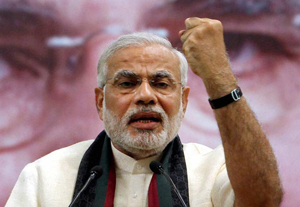New Delhi, Nov 15: After a series of deadly terror attacks in Paris, India is set to raise its pitch to seek stronger global actions against the menace, with Prime Minister Narendra Modi likely to call upon G-20 leaders assembling in Turkey to push for early adoption of the long-pending Comprehensive Convention on International Terrorism by the United Nations.
 The G-20 summit at Antalya in Turkey on Sunday and Monday seems set to be overshadowed by Paris attacks and Modi is likely to stress that the fight against terrorism and sponsors of terrorism will require greater and more effective international cooperation. He will argue that the global consensus against terrorism should not be allowed to be held back by a few and the world must unequivocally reject “selective approaches” in combating terrorism.
The G-20 summit at Antalya in Turkey on Sunday and Monday seems set to be overshadowed by Paris attacks and Modi is likely to stress that the fight against terrorism and sponsors of terrorism will require greater and more effective international cooperation. He will argue that the global consensus against terrorism should not be allowed to be held back by a few and the world must unequivocally reject “selective approaches” in combating terrorism.
The prime minister will join other G-20 leaders for a dinner in Antalaya on Sunday to discuss global terrorism and refugee crisis. He is likely to call for international efforts to counter ideology that underpins extremism and draws youths to terrorism, officials told Deccan Herald in New Delhi.
Modi will also refer to anti-India terrorism emanating from Pakistan. He is likely to recall the November 26-29, 2008 terror strikes in Mumbai and call upon world leaders to nudge the Pakistan government to bring to justice the masterminds of the attacks, which had left over 170 killed and countless others injured. The similarity between 26/11 attacks in Mumbai and the string of terror strikes in Paris late on Friday already caught the attention of the international community.
Though the G-20 generally focuses on international economy, Turkey, which currently holds the presidency of the bloc, also included in the agenda issues related terrorism, with particular emphasis in the situation in Iraq and Syria, where Islamic State still controls large territories.
Modi, who was on a visit to London till Saturday, and British Prime Minister David Cameron on Saturday agreed to continue to work together to disrupt all financial and tactical support for terrorist networks to prevent terror strikes and to counter violent extremism, including through exchanges of best practices and technologies.
New Delhi has of late sharpened its criticism against the United Nations Security Council for its “less than robust” response to the threat of terrorism, especially in Asia and Africa.
“The increasing number and brutality of terrorist acts meanwhile vividly illustrates the ineffectiveness of the (UN Security) Council to counter terrorism,” Ashoke Mukherjee, Permanent Representative of India to the UN, told the General Assembly of the international organisation on Thursday.
India is likely to redouble efforts to end impasse in the negotiations over the UN Comprehensive Convention on International Terrorism, which New Delhi has been pushing for since 1996.
Though a draft text of the CCIT is pending before the General Assembly since 2008, negotiations are currently deadlocked, primarily due to disagreements over the definition of terrorism.
“I would like the UN that is celebrating its 70th anniversary to not waste anytime in defining terrorism,” Modi said in London on Saturday.






Comments
Add new comment